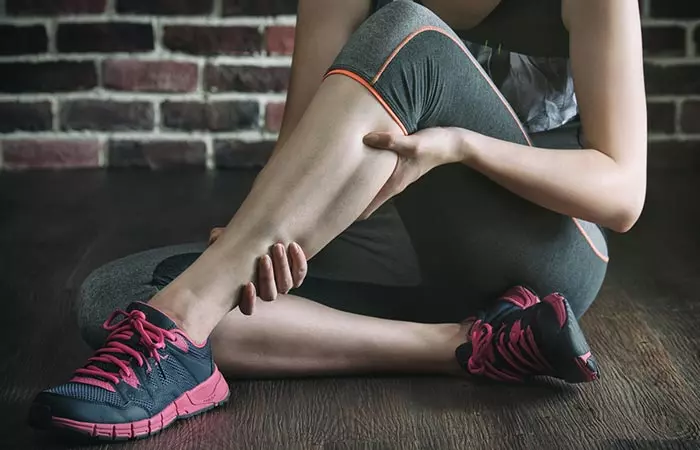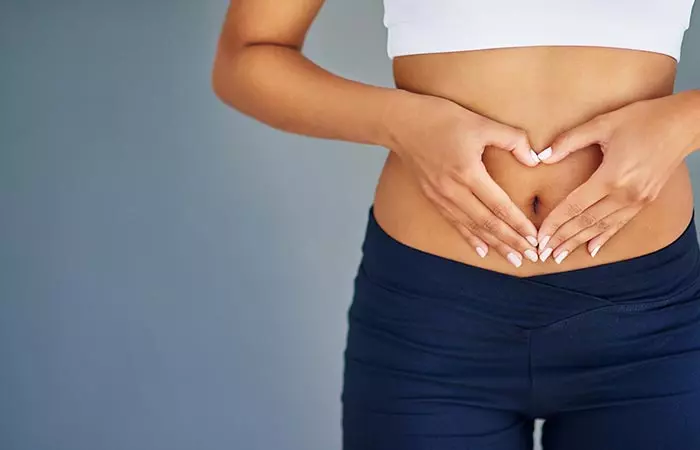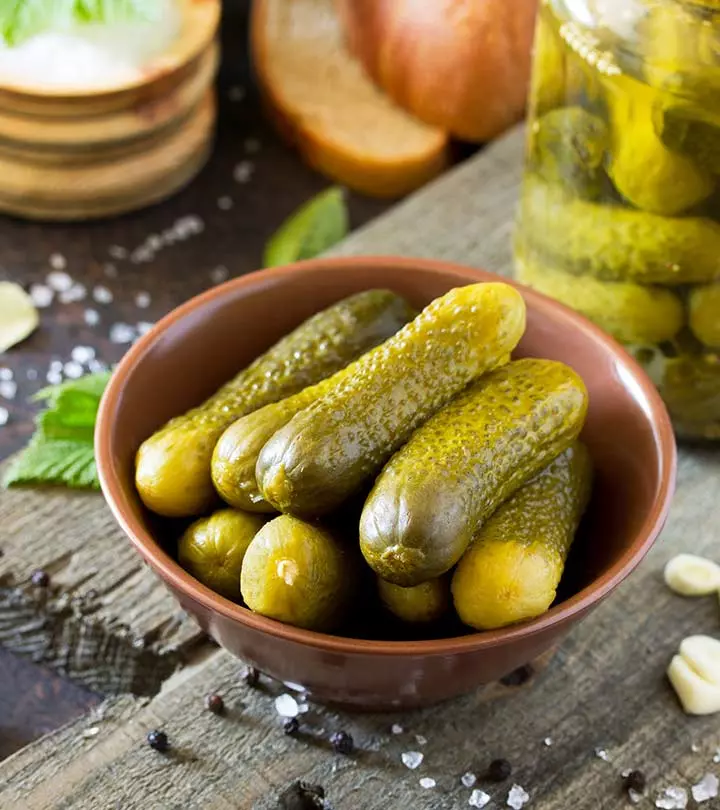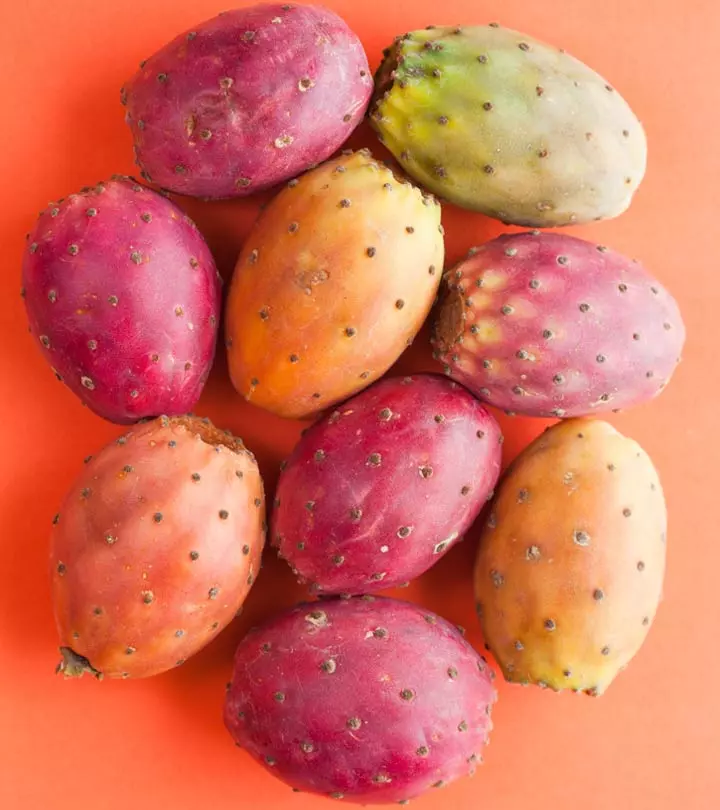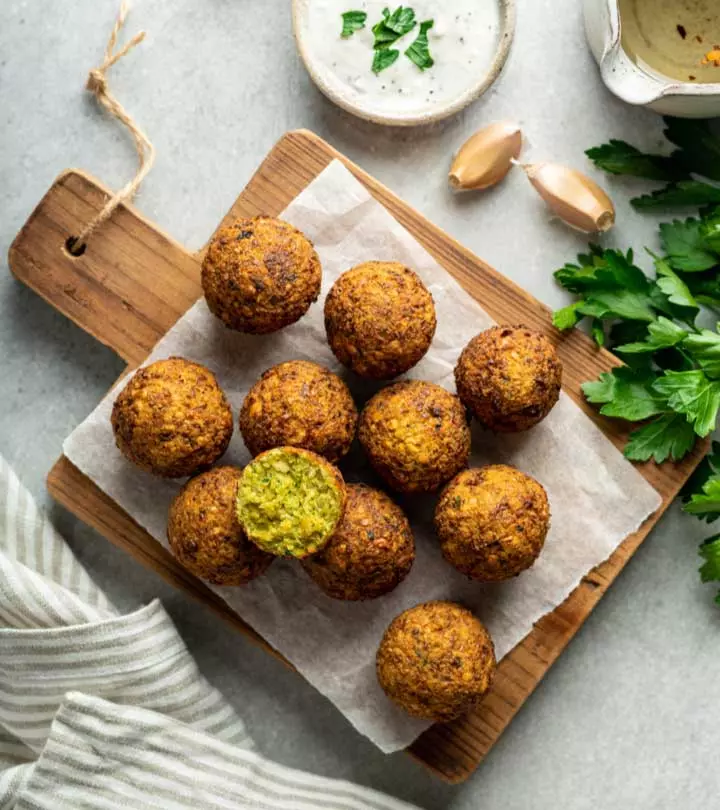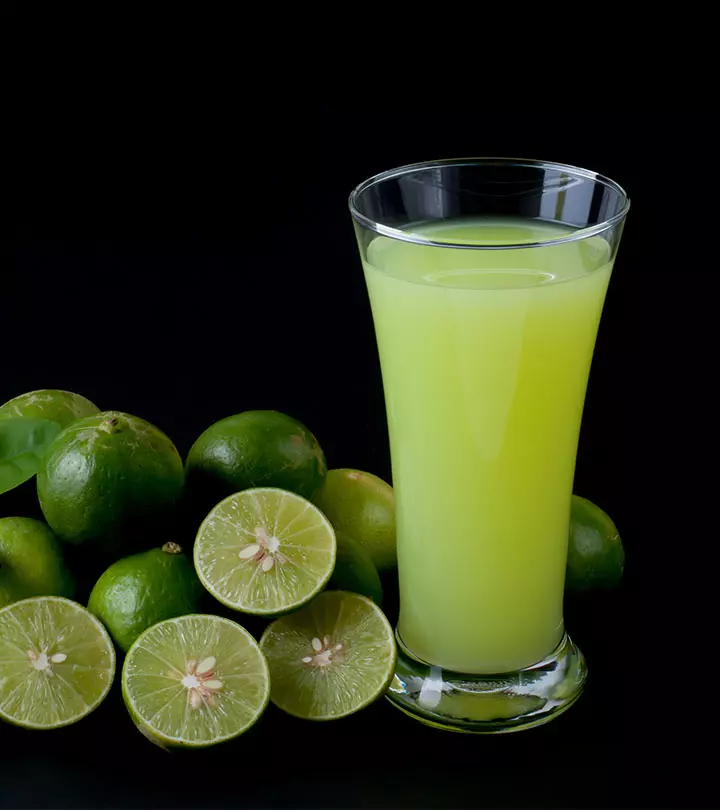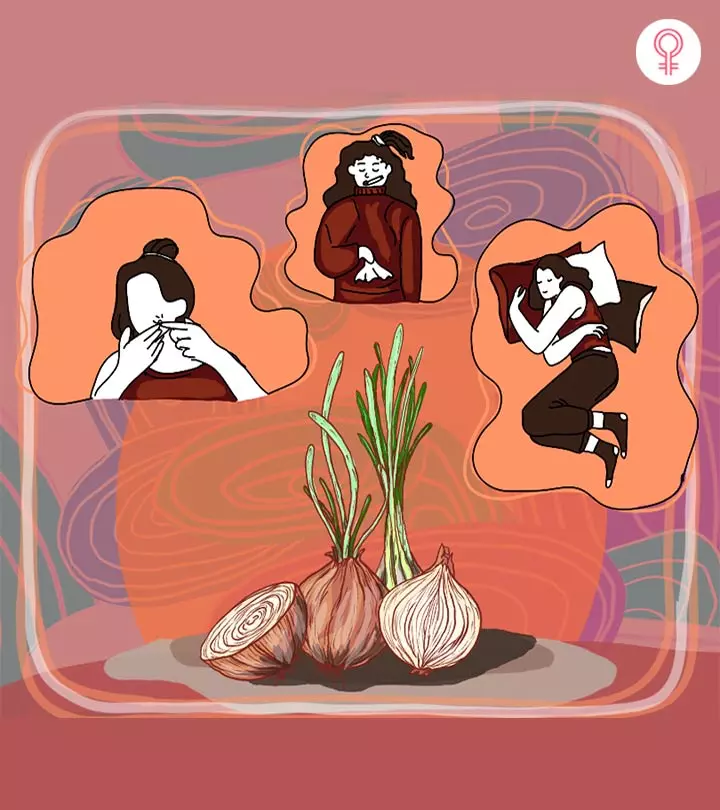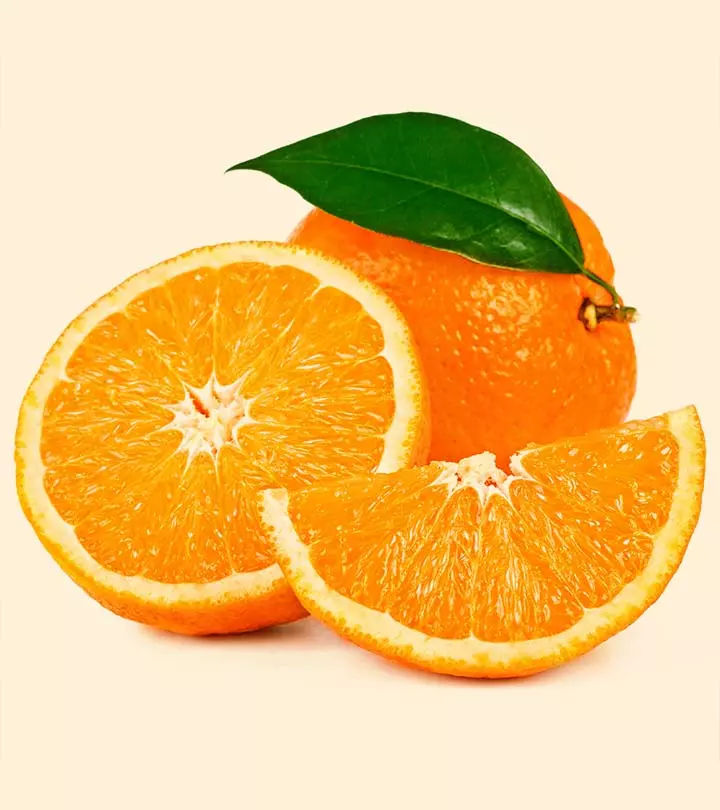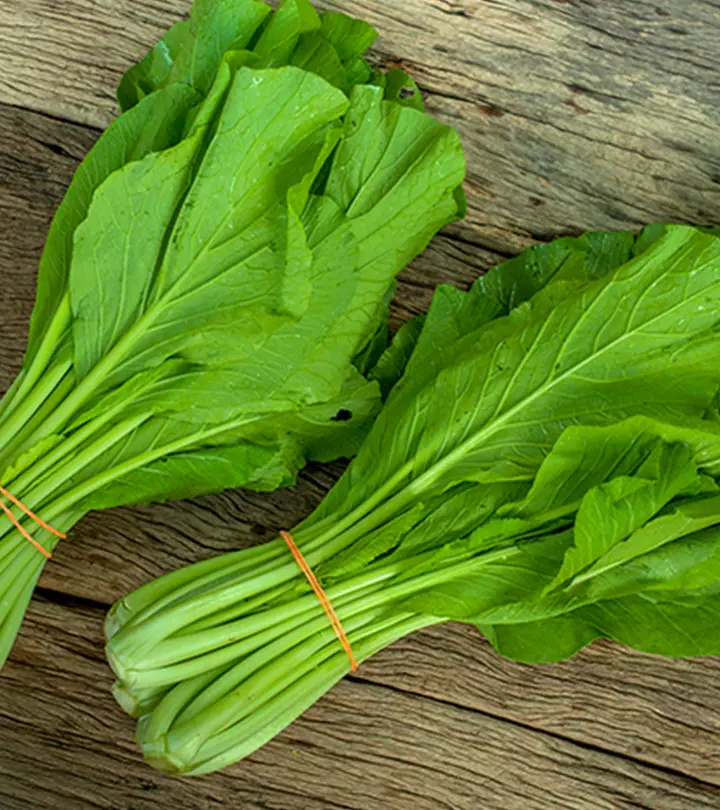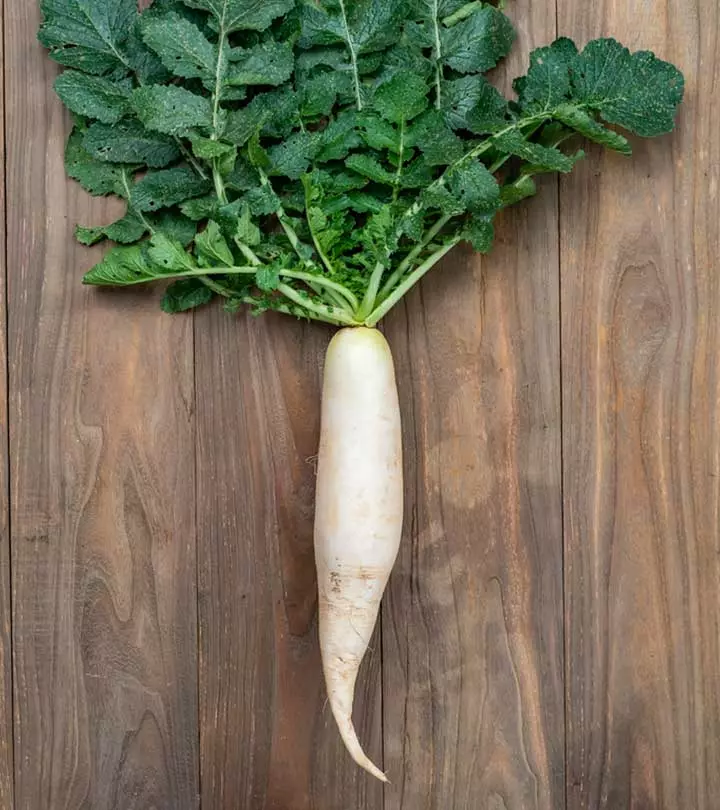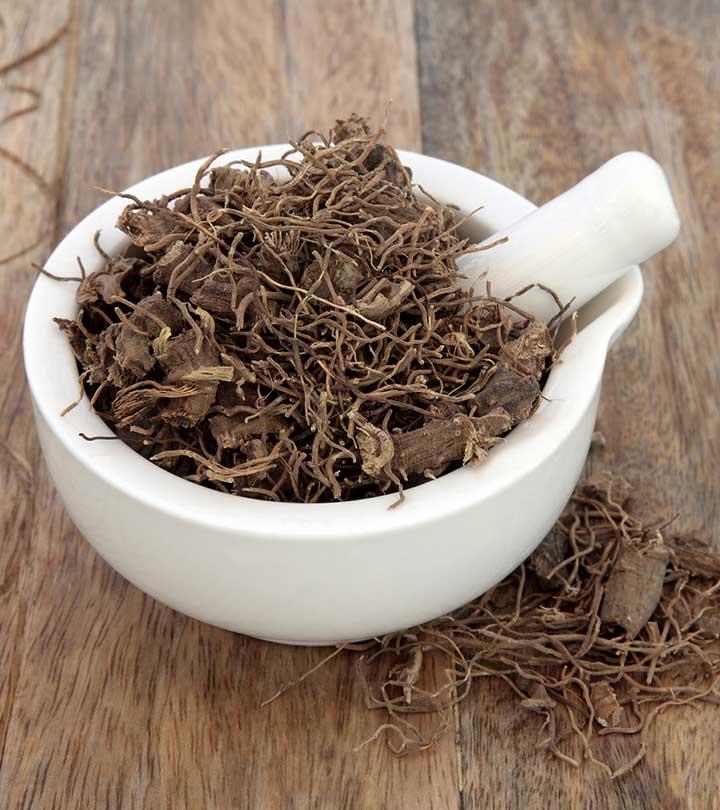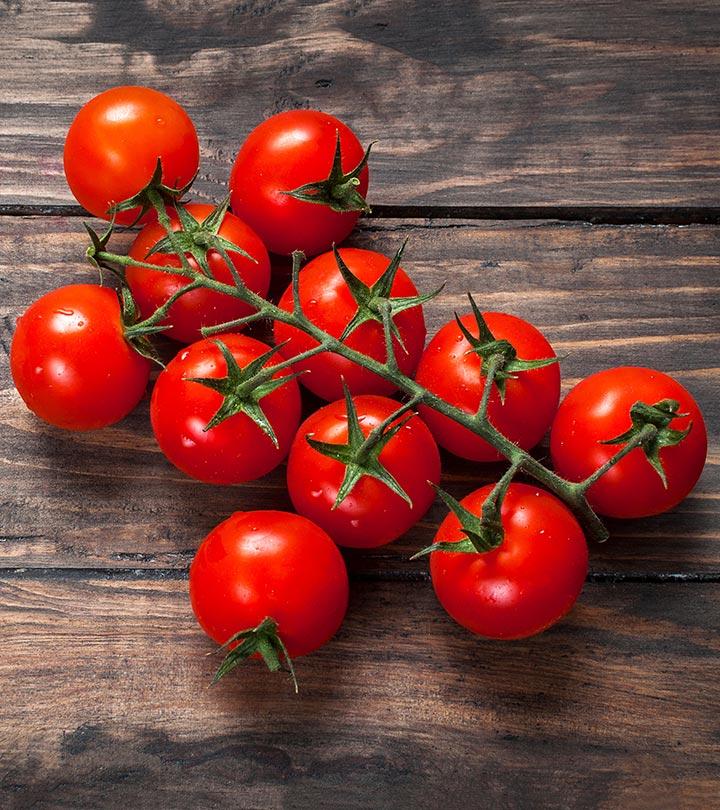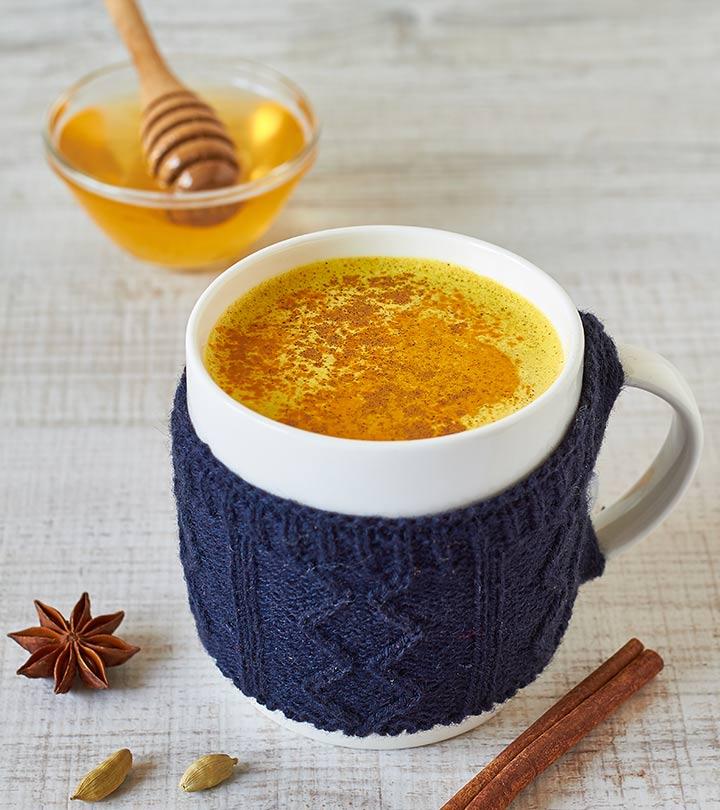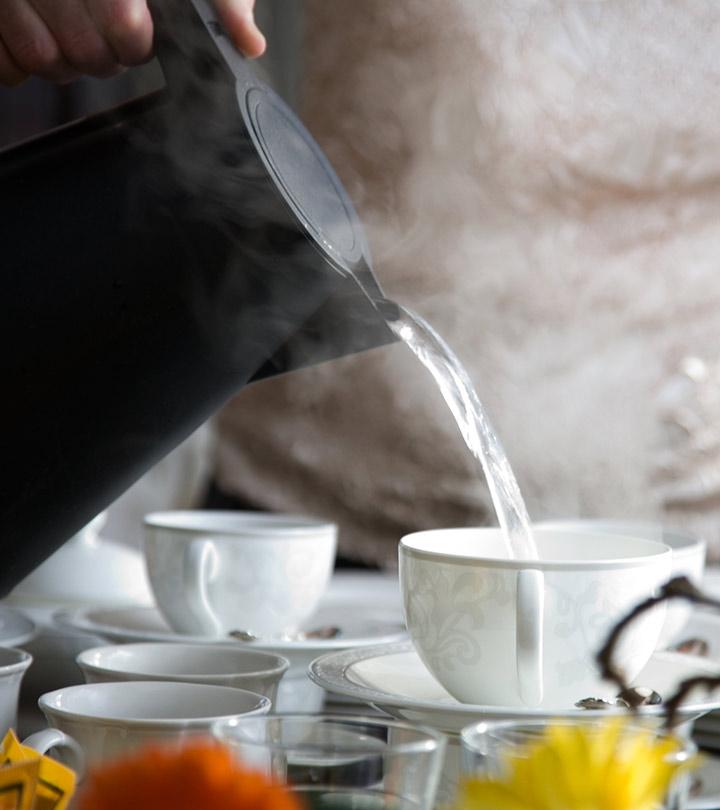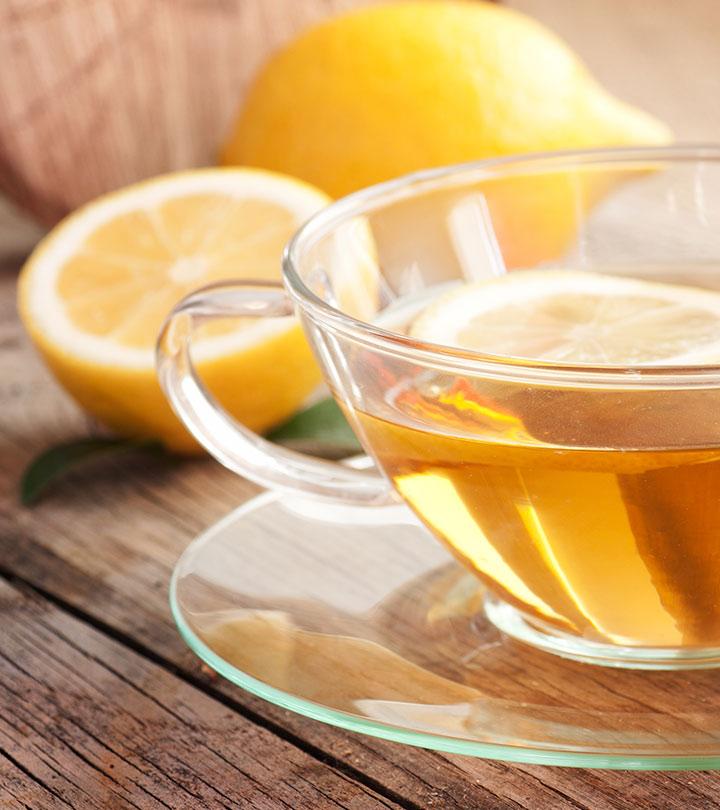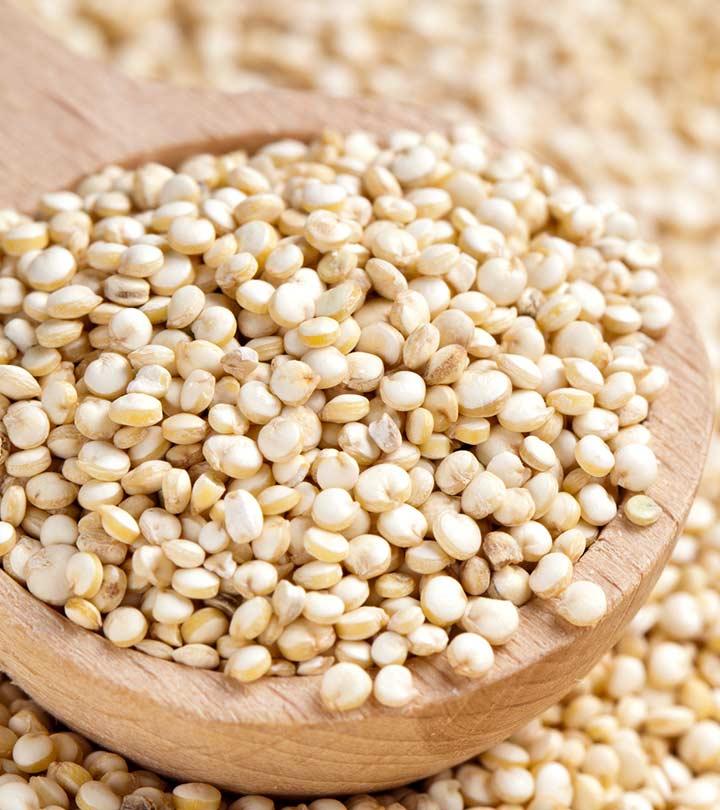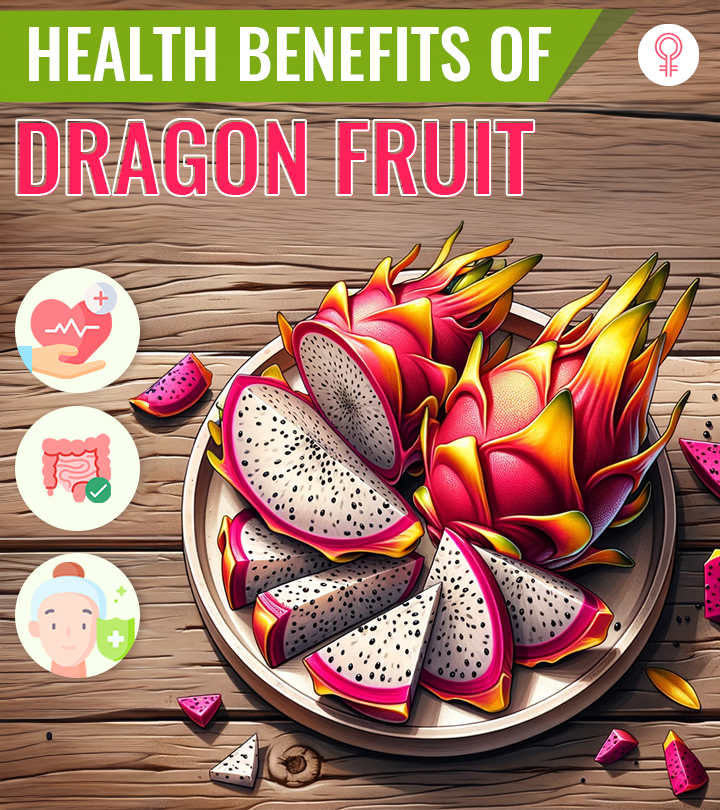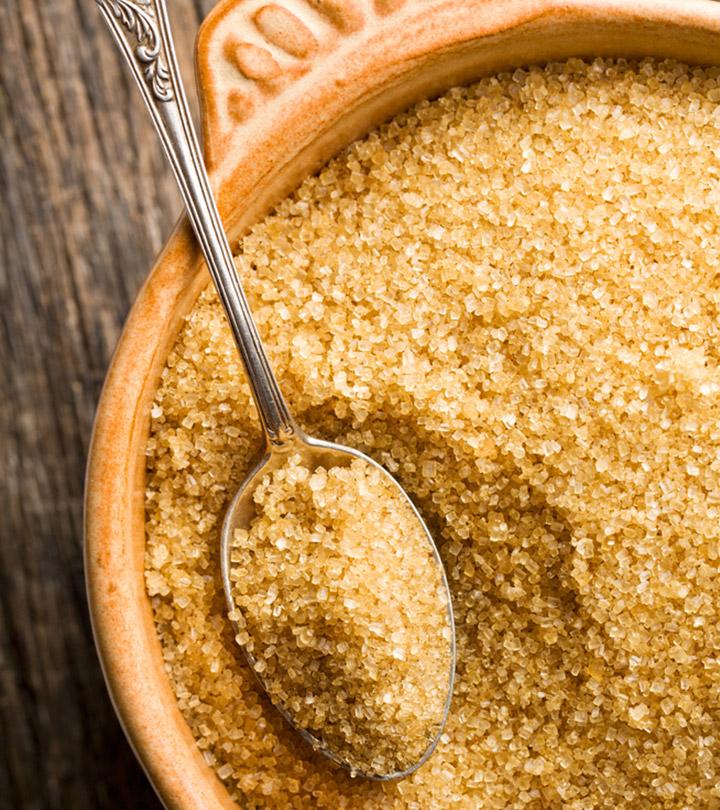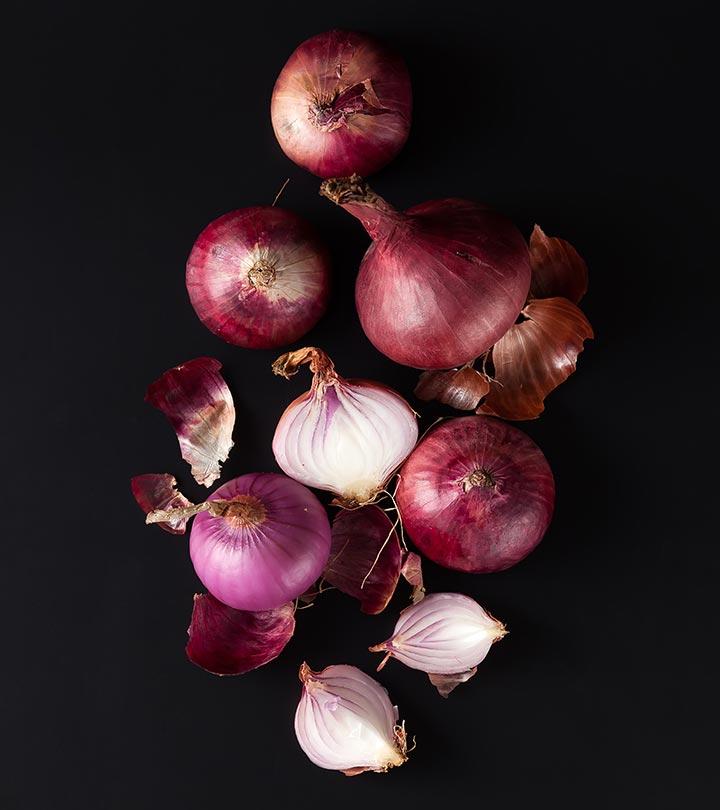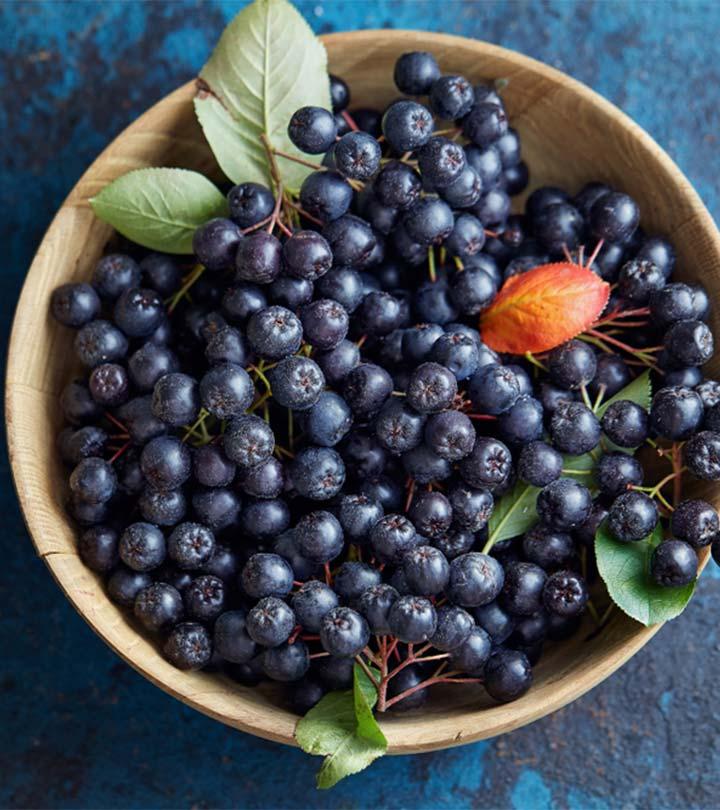8 Benefits Of Pickle Juice, Its Nutrition, And Recipes
Getting rid of cramps, hangovers, and dehydration has never been simpler.
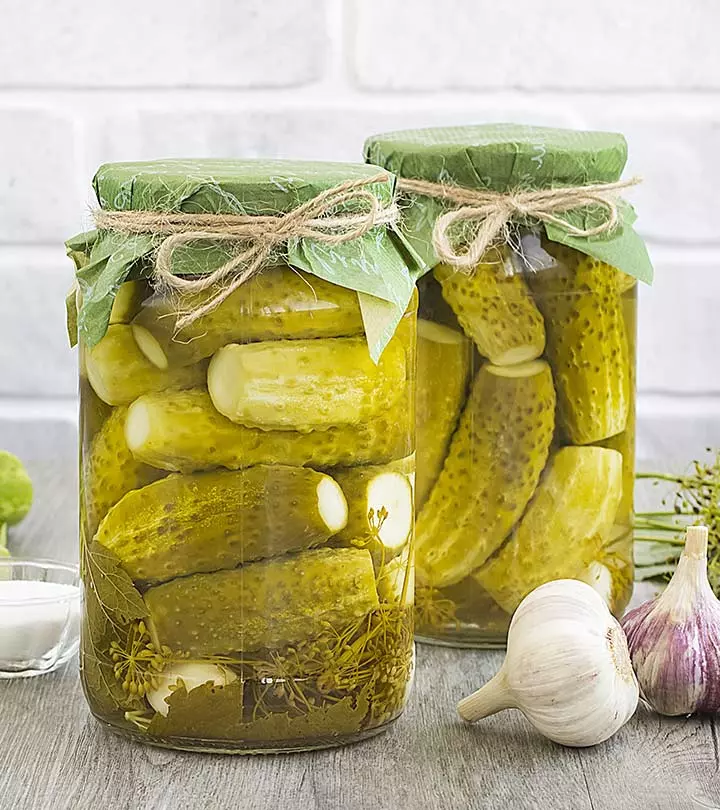
Image: Shutterstock
There are many health benefits of pickle juice. Drinking a glass of pickle juice can prevent post-workout cramps. This fermented cucumber product is a good source of nutrients and vitamins A, C, and K, potassium, magnesium, and calcium. Consuming some of this juice may aid in your recovery, and workouts in the gym may get more productive.
Pickle juice can help you manage hangovers, lose weight and improve your gut health. This article discusses this nutritious juice’s benefits, potential side effects, and nutritional profile. Keep reading.
 Know Your Ingredient: Pickle Juice
Know Your Ingredient: Pickle JuiceWhat Is It?
Nutrient-rich brine or salt solution that is produced in the process of pickling.
What Are Its Benefits?
Improves gut health, fights dehydration, aids weight loss, and helps manage cramps and hangovers.
Who Can Use It?
Generally suitable for all except those with gastrointestinal issues and gout.
How Often?
Regularly, but in moderation. Should be taken in moderation due to its high sodium content.`
Caution
Its high sodium content can cause stomach issues in some individuals. It can also lead to uric acid buildup in the body.
In This Article
Why Should You Have Pickle Juice Anyway?
Why? It is not the only health drink out there. What makes it so special?
First, it is not juice. It is brine or a salt solution used to preserve foods. Its key ingredients are water and salt. The preserved food, along with the brine, is what we call a pickle.
The most common way of pickling involves cucumbers, in addition to the water and salt. Lactobacillus bacteria ferment the cucumbers and cover their skin. These are the beneficial bacteria, which are often removed during commercial processing and replaced with vinegar instead. Hence, it is always best to make your own pickles at home (we will cover this in a while).
After many weeks of curing, the cucumbers turn to pickles. The pickle juice is what is left behind after the pickles (cucumbers) are removed. This is the same juice that has some super cool health benefits.
A study published by the Harvard Medical School states how fermented foods can boost gut health (1). Another study by the North Dakota State University states how ingesting pickle juice before exercise (with a longer gap) can enhance performance and help maintain core temperature (2).
 Did You Know?
Did You Know?There are several other studies. All of them boil down to one thing – pickle juice sure is beneficial.
What Are The Benefits Of Pickle Juice?
1. Pickle Juice Fights Your Cramps
What if we say pickle juice can resolve your cramps in under a minute and a half? That’s what this research says – drinking 1.5 oz of pickle juice for every 100 lbs of body weight can actually accelerate recovery by a whopping 45% (3).
The protons in pickles activate the spinal column and inhibit the firing of specific nerves that cause leg cramps, thereby, promoting better sports performance. There are areas in the mouth and the esophagusi Also known as the food pipe, it is a long tube that extends from the mouth to the stomach and carries food. through which these nerves can be stimulated – and pickle juice does just that. These properties of the juice may also help treat jerks and twitches associated with restless leg syndrome.
Some sources suggest that the juice, in addition to normal muscle cramps, can be useful in treating menstrual cramps as well.
Khyati Jain, a certified yoga trainer and blogger, describes her experience of how drinking pickle juice helped treat her cramps. She writes, “It is believed that vinegar-based drinks like pickle juice, helps in reducing cramps as it triggers a reflex after ingestion that reduces the motor neuron activity that leads to cramping muscles.” She further adds, “I have tried sports drinks, coconut water, and muscle electrolytes all for nothing — until I tried this unusual drink that actually helped me get rid of these monstrous leg cramps (i).”
2. Treats Your Hangover
Hangovers can be torturous. And nobody wants to stay there. If you are looking for a remedy, turn to pickle juice.
Excess alcohol can deplete your body of water and electrolytes, causing a hangover. This is where the salts in pickle juice come to the aid. They replenish the lost salts and bring your body back in balance. Also, the salt in pickles can naturally make you drink more water. This also hydrates you.
 Quick Tip
Quick Tip3. May Aid Weight Loss
Pickle juice is the ideal replacement for high-calorie energy drinks – in case you are looking to lose weight. Though pickle juice has no fat, it can have few calories. But it sure can be a great deal when compared to most of the high-calorie energy drinks in the market.
Commercially available pickle juice contains vinegar, which, as per studies, may help weight loss (4).
4. Boosts Your Gut Health
The probiotics in pickle juice do the trick – they encourage the growth of the good gut bacteria, thereby boosting digestion. Studies also show how taking probiotics can cut the risk of colorectal cancer (5).
Some sources suggest that pickle juice may treat heartburn, thanks to its vinegar content. But the same pickle juice may have the opposite effect in some people. So, please consult your doctor before taking pickle juice for this purpose.
5. Pickle Juice Fights Dehydration
Thanks to the sodium and potassium content, pickle juice combats dehydration too. Sodium and potassium are electrolytes the body loses through sweat. Though plain water can work well in combating dehydration, pickle juice aids faster recovery.
6. May Treat Sore Throat
We only have anecdotal evidence here. Pickle juice may relax your throat muscles, thereby treating sore throat.
7. Can Refresh Your Breath
Nothing can turn down someone like bad breath. The bacteria in the mouth cause it, and pickle juice helps in eliminating these bacteria.
The vinegar in pickle juice has antibacterial properties, which help cleanse your mouth and eliminate bad breath. Sipping and swigging some pickle juice can freshen and sweeten your breath.
8. May Help Lower Blood Sugar Levels
The vinegar in pickle juice may have a minor effect on blood sugar levels. Studies suggest that vinegar may help improve insulin sensitivity and reduce blood sugar spikes after eating (6). However, further studies are warranted in that regard. Also, the impact of pickle juice on blood sugar is relatively modest and it should not be considered a primary way of managing blood sugar levels. If you want to regulate your blood sugar levels, focus on a balanced diet and regular physical activity. Consult a doctor for a personalized treatment plan to help you keep your blood sugar levels in check.
These are the ways pickle juice can make your life easier. But apart from what we discussed, the juice has some other important nutrients too.
What Is The Nutritional Profile Of Pickle Juice?
| Calorie Information | ||
|---|---|---|
| Amounts Per Selected Serving | %DV | |
| Calories | 17.2(72.0 kJ) | 1% |
| From Carbohydrate | 13.4(56.1 kJ) | |
| From Fat | 1.7(7.1 kJ) | |
| From Protein | 2.1(8.8 kJ) | |
| From Alcohol | 0.0(0.0 kJ) | |
| Protein & Amino Acids | ||
| Amounts Per Selected Serving | %DV | |
| Protein | 0.9 g | 2% |
| Vitamins | ||
| Amounts Per Selected Serving | %DV | |
| Vitamin A | 262 IU | 5% |
| Vitamin C | 1.1 mg | 2% |
| Vitamin D | ~ | ~ |
| Vitamin E (Alpha Tocopherol) | 0.1 mg | 1% |
| Vitamin K | 55.8 mcg | 70% |
| Thiamin | 0.0 mg | 3% |
| Riboflavin | 0.0 mg | 2% |
| Niacin | 0.1 mg | 1% |
| Vitamin B6 | 0.0 mg | 2% |
| Folate | 1.4 mcg | 6% |
| Vitamin B12 | 0.0 mcg | 0% |
| Pantothenici Substance also known as B5, works to help the body to convert all consumed food into glucose, and subsequently energy. Acid | 0.1 mg | 1% |
| Choline | 4.9 mg | |
| Betaine | 0.0 mg | |
| Minerals | ||
| Amounts Per Selected Serving | %DV | |
| Calcium | 60.1 mg | 6% |
| Iron | 0.5 mg | 3% |
| Magnesium | 10.0 mg | 3% |
| Phosphorus | 17.2 mg | 2% |
| Potassium | 132 mg | 4% |
| Sodium | 1251 mg | 52% |
| Zinc | 0.2 mg | 1% |
| Copper | 0.0 mg | 2% |
| Manganese | 0.1 mg | 3% |
| Selenium | 0.1 mcg | 0% |
| Fluoride | ~ | |
Vitamin K is the most abundant nutrient in pickle juice. The juice also contains vitamins A and C, antioxidants, calcium, potassium, and magnesium.
Impressive, isn’t it? But how do you make pickle juice?
How To Make Pickle Juice At Home
What You Need
- 1 gallon of cold water
- 35 to 40 small pickling cucumbers
- 1 cup of raw cider vinegar
- 4 cloves of garlic
- 2 tablespoons of pickling spices
- 2/3 cups of Kosher salt
- 4 fresh dill heads
Directions
- Wash the cucumbers first. Don’t scrub them.
- Trim the ends of each cucumber and slice in half lengthwise.
- In a separate glass jar, layer the sliced cucumbers and dill heads and garlic.
- Stir together the remaining ingredients in a separate bowl until the salt dissolves.
- Pour this brine over the cucumbers. Ensure all are submerged.
- Cover the jar with a cheesecloth.
- Store away from direct sunlight for 2 to 4 days. You can also wait until the cucumbers taste like pickles.
- Cap the container with a lid. You can store it in your refrigerator for 6 months to a year.
Great. But is there any other way of taking pickle juice?
Popular Pickle Juice Recipes
1. Pickle Brine Gazpacho
What You Need
- 1 cup of pickle brine
- 8 slices of bread (remove the crusts and tear them into chunks)
- 2 pounds of seeded ripe tomatoes
- 3 quartered shallots
- ½ cup of extra virgin olive oil
- 2 garlic cloves
- Fresh herbs, for garnish
- ½ cup of tomato juice (if required)
Directions
- Place the bread in the food processor along with pickle brine.
- After it soaks for 5 minutes, add the tomatoes, garlic, shallots, and the tomato juice.
- Process it until you get a thick consistency like that of a soup.
2. Pickle Juice Vinaigrette
What You Need
- ¼ cup of pickle juice
- 2 tablespoons each of olive oil and vegetable oil
- 1 tablespoon of distilled white vinegar
- 1 tablespoon of strained spices and garlic
- 1 small minced and peeled shallot
- 1 small minced and peeled garlic clove
- A pinch of red pepper flakes
- Kosher salt, for taste
Directions
- Whisk all the ingredients in a bowl thoroughly.
- You can use it immediately to dress your salads or store in the refrigerator in an airtight container for up to two weeks.
Sumptuous recipes with loaded flavors, aren’t they? But hey, pay close attention – we don’t recommend everyone to have it.
Who Should Not Have Pickle Juice?
Though the juice does not have any serious side effects, it is not meant for all. Please avoid the juice if:
- You want to cut down sodium or are on a low-sodium diet for any reason (including conditions like hypertensioni A condition that often occurs without any symptoms and in which, the blood exerts too much pressure on the arterial walls. ).
- You suffer from gout or have a family history of gout – as the juice can increase uric acid build-up.
Pickle juice may also cause water retention and bloating. So, if these are a concern for you, please avoid pickle juice.
Infographic: Fun Facts About Pickling
You have read up on the benefits, nutritional profile, and recipes of pickle juices. But are you aware of some tidbits about pickling? For example, pickle juice
is added to alcoholic and mocktail drinks to give it a tangy flavor. The juice also works as a hangover remedy. Looking for more such fun facts? Scroll down and go through the infographic below!

Illustration: StyleCraze Design Team
Pickle juice is a broth or solution left behind after removing pickles. There are several health benefits of pickle juice. It is a good source of many vitamins and minerals that help treat many ailments. Drinking pickle juice may fight post-workout cramps, treat a hangover, aid in weight loss, boost gut health and hydration level, and treat sore throat. However, some people may experience certain side effects after consuming it. People on a low-sodium diet and those with gout should avoid intake of pickle juice.
Frequently Asked Questions
How long does pickle juice last?
Whether store-bought or homemade, if properly sealed, pickle juice might last up to a year.
Where to buy pickle juice?
You can purchase pickle juice from your nearest supermarket or even online.
Does pickle juice help pass a drug test?
No. It doesn’t. The best way to pass a drug test is not taking any drugs.
Is pickle juice safe during pregnancy?
Though it is safe in small amounts, we suggest you don’t take the juice during pregnancy. The high sodium content can be harmful to the baby and the mother.
How much pickle juice can I drink a day?
You can consume 1.5-3 ounces or six tablespoons of pickle juice daily, but you should not exceed this amount.
Do pickles juice burn belly fat?
No, there is no evidence that suggests pickle juice specifically burns belly fat, but it may help overall weight loss as it has few calories and no fat.
Does pickle juice help with anxiety?
Yes, fermented foods like pickles help in alleviating the symptoms of anxiety and depression as they are rich in probiotic microorganisms that fight oxidative stress and restore serotonin levels (7).
Key Takeaways
- Pickle juice contains probiotics that can enhance the gut microbiota, boost the immune system, and reduce oxidative stress.
- It improves intestinal health, prevents cramps after exercise, and deals with dehydration.
- You should ideally consume six tablespoons of pickle juice daily.
- Avoid consuming too much pickle juice, as it may result in bloating and water retention.
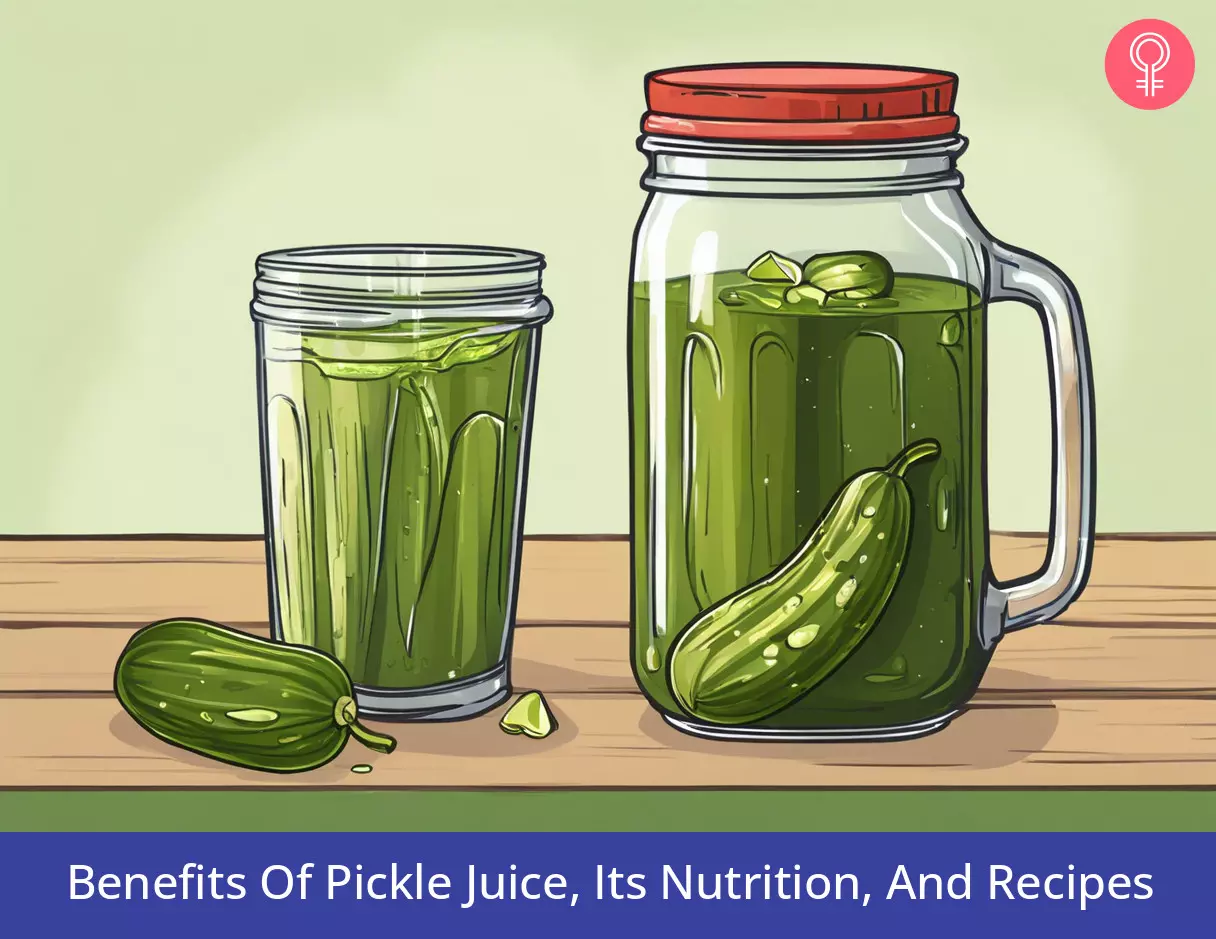
Image: Stable Diffusion/StyleCraze Design Team
Learn all about pickle juice to drink and the fantastic benefits it can provide. Stay refreshed, recharged, and informed by checking out this video.
Personal Experience: Source
StyleCraze's articles are interwoven with authentic personal narratives that provide depth and resonance to our content. Below are the sources of the personal accounts referenced in this article.
i. The Unusual Drink You Should Drink After a Long Run To Beat Leg Crampshttps://medium.com/runners-life/the-unusual-drink-you-should-drink-after-a-long-run-to-beat-leg-cramps-2052ca4f9b14
References
Articles on StyleCraze are backed by verified information from peer-reviewed and academic research papers, reputed organizations, research institutions, and medical associations to ensure accuracy and relevance. Read our editorial policy to learn more.
- “Fermented foods for better gut health”. Harvard Medical School.
- “The effect of pre-exercise ingestion of pickle juice…”. North Dakota State University.
- “Reflex inhibition of electrically induced…”. US National Library of Medicine.
- “Vinegar intake reduces body weight, body fat mass…”. Central Research Institute, Japan.
- “Potential of probiotics, prebiotics and synbiotics for…”. US National Library of Medicine.
- “Who Benefits from Fermented Food Consumption? A Comparative Analysis between Psychiatrically Ill and Psychiatrically Healthy Medical Students”. US National Library of Medicine.
- “Vinegar supplementation lowers glucose and insulin responses and increases…”. US National Library of Medicine.
Read full bio of Cheryl Mussatto
Read full bio of Arshiya Syeda
Read full bio of Aparna Mallampalli





